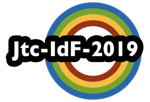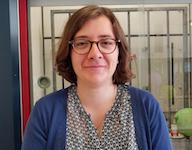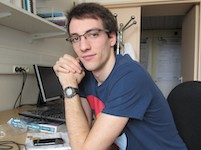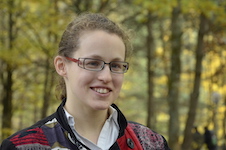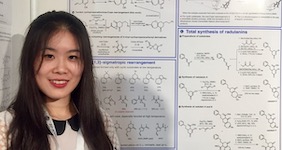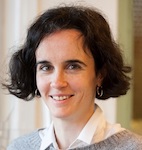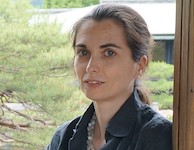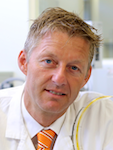|
|
|
ConférencesLauréats des Prix de thèse 2019 Prix d’excellence en « Chimie organique » Dr. Marie-Léonie DELCOURT (Université Paris Descartes) Conception and evaluation of [2.2]paracyclophane building blocks for the synthesis of specific and selective RNA ligands
Prix d’excellence en « Chimie inorganique, minérale et des matériaux » Dr. Mathieu XEMARD (Ecole Polytechnique, Université Paris Saclay)
Prix d’excellence en « Chimie théorique, physique ou analytique » Dr. Thuan Nguyen PHAM TRUONG (ITODYS, Université Paris Diderot) Prix industriel « SEQENS » Dr. Lucie JARRIGE (ICSN, Université Paris Saclay) Prix industriel « YNSECT » Dr. Wei ZHANG (Sorbonne Université, Muséum d'Histoires Naturelles)
Conférences Plénières
Dr. Clémence Allain (ENS Paris Saclay) Molécules et matériaux mécanofluorochromes comme sondes locales de contraintes
J'ai soutenu ma thèse, qui portait sur le marquage d'ADN par des sondes fluorescentes, et était dirigée par Marie-Paule Teulade-Fichou, en 2006. J'ai ensuite effectué un 1er post-doctorat à Paris, avec Laurent Ruhlmann et Berni Hasenknopf, sur la synthèse et l'étude de complexes porphyrines-polyoxométallates, puis un 2nd post-doctorat en Angleterre, avec Steve Faulkner, sur la synthèse et l'étude de complexes multimétalliques de lanthanides pour la luminescence. J'ai ensuite été recrutée début 2010 comme chargée de recherches CNRS au laboratoire PPSM à l'ENS Paris-Saclay (ex ENS-Cachan), initialement pour travailler avec Pierre Audebert sur le développement de nouvelles tétrazines. Depuis 2014, je développe un projet sur la synthèse et l'étude de molécules et matériaux mécanofluorochromes comme sondes de contraintes mécaniques, qui a été soutenu par une ERC Starting Grant en 2016. J'ai reçu la médaille de bronze du CNRS en 2017.
Prof. Ilaria Ciofini (Chimie ParisTech) Density based methods and descriptors for the modelling of molecular devices
Dr Ilaria Ciofini (born 1973) studied Chemistry at the University of Florence (Italy). After a PhD in theoretical Chemistry at the university of Fribourg (Switzerland) and a postdoctoral position in Würzburg (Germany), she joined CNRS. She is the author of more than 200 papers and currently laureate of an ERC Consolidator Grant (STRIGES) focused on the development and application of density based indexes for the description of excited states’ properties and reactivity.
Dr. Raphaël Rodriguez (Institut Curie) Reprogramming the reactivity of iron in cancer
Raphaël Rodriguez carried out his PhD studies under the supervision of Sir J. Baldwin at Oxford (UK), where he completed the total synthesis of complex natural products. He joined the University of Cambridge in November 2005 as a Cancer Research UK Postdoctoral Fellow, working under the mentorship of Sir S. Balasubramanian and was promoted to Senior Research Associate in 2009. From 2009 to 2012, he trained as a cell biologist under the guidance of Prof. S. Jackson at the Gurdon Institute in Cambridge. His studies established a firm link between G-quadruplex DNA and genome instability in human cells. In 2012, he obtained the Habilitation to Direct Research and joined the CNRS as a Principal Investigator. He then moved to Institut Curie in 2015 and was promoted Director of Research in 2017. His team investigates the role of d-block metals in the regulation of cellular plasticity, the biological process that enables cells to acquire metastatic and drug resistance properties. Their recent discoverythat mesenchymal cancer cells are addicted to iron prompted the design of a new generation of drugs with controlled cellular localization. These molecules are able to reprogram the reactivity of iron, to abolish cellular plasticity and to kill persister cancer cells. He has gained international recognition with key contributions in chemistry and biology that can impact on human medicine. He co-authored 70 articles, books and scientific commentaries. He is listed as a co-inventor on several patents and commercialized 3 biologically active small molecules. He was awarded a competitive ERC consolidator grant, has been elected Fellow of the Royal Society of Chemistry, was recently nominated Franco-British Young Leaders, is the first French citizen to become a recipient of the Tetrahedron Young Investigator Award in Bioorganic and Medicinal Chemistry and has recently received the Grand Prix de l'Institut de France Charles Defforey. He is the scientific co-founder of the biotech company SideROS.
Prof. Dr. Uwe Meierheinrich (Université Côte d'Azur, Nice)
Professor Meierhenrich studied chemistry at the Philipps-University Marburg and Bremen University, which are both in Germany. After conducting post-doctoral research at the Max Planck Institute for Solar System Research in Göttingen, and a post-doctoral fellowship at the Centre de Biophysique Moléculaire in Orléans, he moved to the University Nice Sophia Antipolis in France in 2004, which is now part of the newly created excellence Université Côte d’Azur. Professor Meierhenrich’s research focuses on molecular asymmetry and chirality. He has published over 150 articles, including articles in Natureand Science, as the corresponding author, and he gave 60 invited seminars at top international conferences including conferences at Oxford and Princeton University. Today, Professor Meierhenrich is director of the Chemical Institute (ICN) at the University Nice Sophia Antipolis.
|
